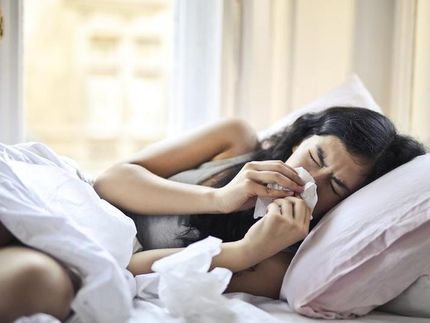Can videos boost the immune system?
Watching disease videos increases SARS-CoV-2-specific antibodies
Advertisement
Test subjects who watch videos of people with symptoms typical of Covid-19 produce more secretory immunoglobulin A against the coronavirus spike protein. This is the result of a study by researchers from the Department of Biology at Universität Hamburg in cooperation with the University of Tübingen involving 45 test subjects. The study has been published in the journal "Scientific Reports".
Secretory immunoglobulin A (sIgA) in saliva is the most important antibody for fighting pathogens in the respiratory tract. It is produced by plasma cells, binds antigens and prevents them from attaching to epithelial cells. Thus, sIgA contributes significantly to the immune defense. Previous studies have already linked high concentrations of sIgA specific for the alpha variant of the coronavirus (SARS-CoV-2-specific sIgA) in saliva to asymptomatic COVID-19 infections, which could indicate its protective role against SARS-CoV-2.
Given these functions, SARS-CoV-2-specific sIgA may also have the potential to neutralize SARS-CoV-2 in the body. Researchers led by the Department of Biology at the University of Hamburg have now found that after a short time, there is more spike protein-specific sIgA in the saliva of test subjects who watch a video of people with COVID-19-typical respiratory symptoms than in people who watch a video of healthy people.
"The average secretion increased by 24.4 percent after five minutes of stimulation with a disease video," says junior professor Dr. Esther Kristina Diekhof from the Department of Biology at the University of Hamburg and senior author of the study. "The fact that this increase occurred even though there were no actual pathogens suggests that the SARS-CoV-2-specific sIgA could be part of a proactive immune response that prepares the oral cavity for viral entry." Shortly after the end of the videos, the slgA level in saliva returned to baseline.
The scientists also investigated the specific antibody (anti-RBD) against the receptor-binding domain (RBD) of SARS-CoV-2. The RBD enables the virus to enter cells and trigger an infection. In the researchers' current study, this antibody showed no change after stimulation with the disease videos.
The findings indicate different functions of the antibodies: While the SARS-CoV-2-specific sIgA presumably plays a role in general immune exclusion and is already released more proactively by simply watching the video, anti-RBD is probably more involved in the actual neutralization of the viruses and is only released more after actual contact with the pathogen. Future studies should investigate this interpretation in more detail.
The study involved 45 people between the ages of 18 and 35 who had been vaccinated or previously infected with the coronavirus (22 of whom were women). Most of the tests in the study took place during the first and second Omicron wave of the COVID-19 pandemic and thus in a high-risk context for infection with SARS-CoV-2. The participants were shown a five-minute illness video showing people with various respiratory symptoms typical of COVID-19 (e.g. sneezing or coughing).
"From the available results, we cannot clearly conclude that the immune response of the mucous membranes to the video of the respiratory disease generally follows the observed pattern of an increase in SARS-CoV-2-specific sIgA in every situation," says PhD student Judith Keller, first author of the study. For other respiratory viral pathogens such as influenza, it has been shown that a high risk context (e.g. flu season) is associated with an increase in sIgA, while this was not the case in a lower risk context (e.g. summer months).
Note: This article has been translated using a computer system without human intervention. LUMITOS offers these automatic translations to present a wider range of current news. Since this article has been translated with automatic translation, it is possible that it contains errors in vocabulary, syntax or grammar. The original article in German can be found here.
Original publication
Other news from the department science
Most read news
More news from our other portals
See the theme worlds for related content
Topic world Antibodies
Antibodies are specialized molecules of our immune system that can specifically recognize and neutralize pathogens or foreign substances. Antibody research in biotech and pharma has recognized this natural defense potential and is working intensively to make it therapeutically useful. From monoclonal antibodies used against cancer or autoimmune diseases to antibody-drug conjugates that specifically transport drugs to disease cells - the possibilities are enormous

Topic world Antibodies
Antibodies are specialized molecules of our immune system that can specifically recognize and neutralize pathogens or foreign substances. Antibody research in biotech and pharma has recognized this natural defense potential and is working intensively to make it therapeutically useful. From monoclonal antibodies used against cancer or autoimmune diseases to antibody-drug conjugates that specifically transport drugs to disease cells - the possibilities are enormous





























































